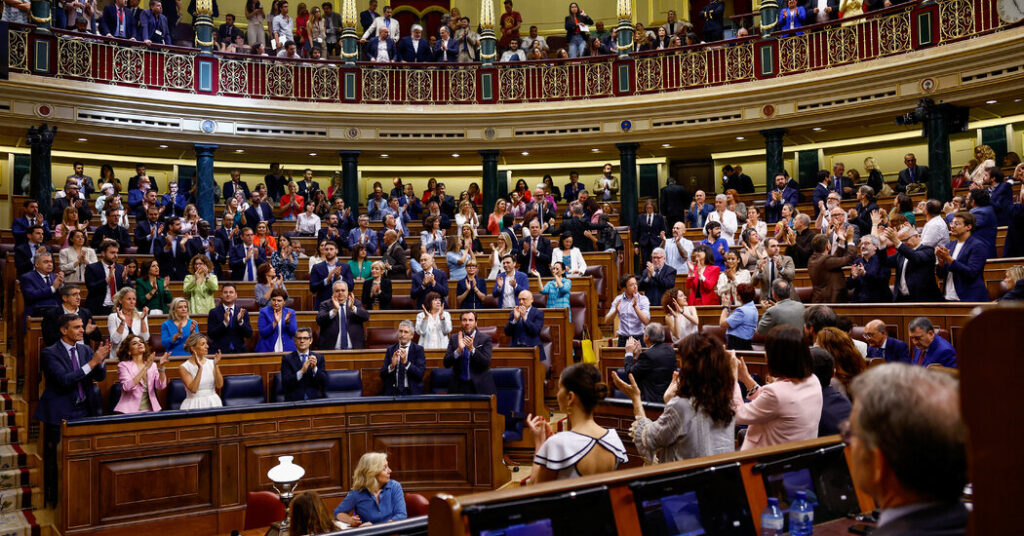Spain’s parliament on Thursday approved a landmark law granting amnesty to Catalan separatists involved in an illegal independence referendum in October 2017, a reprieve that could apply to hundreds of people, including those who have been in self-exile. Carles Puigdemont, the former Catalan leader of the state, has been in charge for seven years.
The measure has been resisted by opposition parties in recent months and sparked widespread anger and mass demonstrations in cities across Spain, with opponents denouncing it as a ploy by Prime Minister Pedro Sánchez to stay in power. Sanchez reached an amnesty deal with the Catalan separatist party “Together for Catalonia” after his party failed to secure a majority in last July’s election.
Cries of “traitor” could be heard from several members of parliament as Sanchez cast his vote on Thursday.
Spanish judges now have two months to implement the new law, although its opponents have vowed to continue trying to block it. Some argue the measure violates the Constitution’s equality principle because it is unfair to others facing legal action.
Madrid regional president Isabel Ayuso said in a radio interview on Thursday that her government would take steps to block implementation of the new law and appeal the law as unconstitutional.
Pablo Simon, a political scientist at Madrid’s Universidad Carlos III, said judges may also file legal challenges if they believe granting a general legal amnesty is discriminatory.
“Each judge has different criteria,” Mr Simon said, adding that they could also appeal to the European Court of Justice for intervention “if they consider that granting a general legal pardon is discriminatory, in which case” The law may be paralyzed.”
The amnesty law applies to those involved in Catalonia’s independence movement, which peaked in October 2017 when the region’s separatist government, led by Puigdemont, ignored a Spanish court order and continued to hold mass protests. referendum.
Many voters were wounded by violent police intervention, and after voting to declare independence, the Spanish government also cracked down, sacking the Catalan government and imposing direct control. Nine political leaders were jailed on charges including sedition, while Puigdemont fled across the border to France and then Belgium, where he was nearly arrested.
While Sanchez’s government has already pardoned jailed political leaders and activists, this pardon goes a step further. It would dismiss the cases of people facing prosecution on a number of charges, including misuse of public funds to fund the 2017 referendum; civil disobedience – for example, teachers opening schools as polling stations; and resisting authority by participating in riots that would impede Spanish law enforcement Gather evidence.
The only exception to the new amnesty legislation is for terrorism-related cases.
The measure was approved by the ruling Socialist Party and its coalition partners after a month-long parliamentary process. The bill was earlier rejected by Spain’s upper house, which has limited powers and is controlled by the opposition Popular Party.
Sánchez and his allies have defended the amnesty as the best way for Catalonia to coexist peacefully. Felix Bolaños, minister in the presidential administration, called the law “a decisive step to end difficult times and start a period of prosperity.”
Míriam Nogueras, a spokesman for Puigdemont’s party, said during a morning parliamentary debate that the bill’s passage was “not a pardon or clemency” but a “victory” for democracy.
But Popular Party leader Alberto Núñez Feijóo dismissed the measure, calling it a “power exchange” for “privilege and impunity.” “You dare not call it coexistence,” he said during the debate. Santiago Abascal, leader of the far-right Vox party, said the law “legitimizes political violence in Spain.”
Despite the political and social backlash, Sanchez’s gamble appears to be paying off. In regional elections on May 12, his branch of the Catalan Socialist Party made history, winning enough votes to form the region’s first party led by an opponent of Catalonia’s independence in more than a decade. government.
That didn’t appear to deter Gabriel Rufían, a left-wing member of Catalonia’s Republican Party, who told parliament on Wednesday that the region’s separatists would use the momentum to demand independence again. “Next stop, the referendum,” he said.
Nogueiras, a spokesman for Puigdemont’s party, called the passage of the law “a historic day.” But the legal path for Mr Puigdemont, who has been a member of the European Parliament since 2019, remains uncertain.
Political analyst Simon speculated that Puigdemont and others could be charged with terrorism if a judge links him to the 2019 riots organized by the Catalan protest group Tsunami Democratic Party at Barcelona’s airport. thus being excluded.
“Let’s see what happens,” Mr. Simon said.

